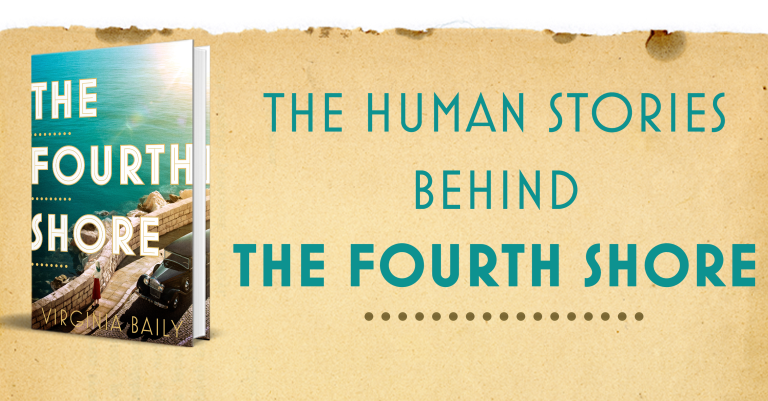The Colours: An Extract

Ellen sees the world differently from everyone else, but living in a tiny town in the north-east of England, in a world on the cusp of war, no one has time for an orphaned girl who seems a little strange. When she is taken in to look after a rich, elderly widow all seems to be going better, despite the musty curtains and her aging employer completely out of touch with the world. But pregnancy out of wedlock spoils all this, and Ellen is unable to cope. How will Jack, her son, survive – alone in the world as his mother was? Can they eventually find their way back to each other?
The Colours is a sweeping novel of how we can lose ourselves, and our loved ones, for fans of Kate Atkinson and Virginia Baily.
ELLEN
1912–16
Da said the Pearson family came out of the sand. He said they were born out of the red clarty sand that stuck to the soles of boots and the hems of frocks. On the beach, the women had deep frills of it around their skirts, so heavy it weighed them down. You couldn’t just brush the sand away, you had to beat your clothes with the palm of your hand like you were smacking them for being naughty. You had to bang your boots against the doorstep and find a knife to gouge away the sand that clung to the heels and round the stitching. But however much you cleaned your clothes, it was always in the seams and the pleats and the pockets. It was in the bed too, trapped in the pillowcases and the folds of the sheets. On wash days, if you filled the basin with clean water and pushed your nightgown under the surface the water turned pink straight away.
And afterwards, when the basin was emptied, there was a sulky red sludge in the bottom and a hard skim of red around the rim.
Teesby was covered in sand. It piled up in the streets and filled the cracks in the pavements and the gutters. It covered the front gardens and got caught in the long grass and the privet and the flower petals. When the wind was bad, the sand would swirl around your ankles, nip your legs and arms like a snappy dog. And when the waves were fierce, the sea would hurl fistfuls of it at the town, then the faces of all the houses were spotted with soggy gobbets of dark red sand.
Da told Ellen that the sand blowing over Teesby came from the Snook. He said the Snook was a sea-spit. The sea carried the sand in its waves then spat it out in the same place year after year. When the tide was high the Snook was an island, and you would have to swim across the bay to reach it. But when the tide was low, you could get there by crossing the river and walking along the causeway over the marsh.
Right at the end of the Snook was a tower. From a distance it was a short stubby thumb of a building against the pale grey sky. ‘They built it to keep the Frenchies out,’ Da said. ‘That was a long time ago.’
If you climbed to the first floor, you could stick your head out of the window and look back at Teesby. From the tower, the town was just a dark-roofed cluster of small-windowed houses that looked like they were trying to ignore the view. But the Snook was different. It was unpredictable: glowing in the sunshine, glowering in the rain.
When Ellen was small, Da had said that the Pearson family came from the Snook. They had pushed their heads out of the sand and levered themselves into the world with their brawny arms. Every Pearson had Snook sand running through their veins, Da said, and Pearson blood was red like the colour of the shore when the tide was low.
But Da’s blood was almost black. He kept coughing it up. She heard him in the night and when she went to his room in the morning, shiny clots were splatted onto his pillowcase and his nightshirt and there was a great streak across his mouth. Henry was leaning over him, dabbing at the drops, gleaming and bright, hanging from the bristles of his beard.
‘Do you want the doctor, Da?’ he asked.
Da tried to lift his hand that had been gripping the bedclothes and managed to wave his fingers a little. ‘Don’t fuss yourselves. I’ll be all right.’
They watched him all morning – Ellen at the end of the bed and Henry beside him – breathing in then breathing out again, labouring, as if he was climbing a steep hill. Sometimes he groaned gently and sometimes the air that came out of his open mouth whistled like the wind spinning round the trees on the moor behind the town. Then he stopped. Swallowed. Took a deep gasping rattling gulp.
‘I suppose you could ask Aunt Minnie to come,’ he finally said, his voice struggling through the thickness in his throat.
It was Henry who ran to the post office to send the telegram. Ellen was only twelve and didn’t know what to do, so she stood in the bedroom waiting for something to happen. Da always got better in the end. He always cleared his throat and sat up in the bed and said something like: ‘So how about a cup of tea, Nell, or a nice boiled egg.’
But he didn’t move. He lay on his back, his breathing quietened now. It sounded like faraway waves, ‘Shush, shush, shush, shush,’ each one fainter than the last.
When Henry returned, he peered at the face on the pillow.
Then he pulled away the sheet and grasped Da’s wrist. ‘I think he’s gone, Nell.’
‘Gone?’
‘Gone to heaven. Didn’t you notice, didn’t you look?’
So this was it. This was what she had been waiting for. She held her breath and clutched her hands together until her knuckles turned white. If she didn’t breathe or move or think she could almost believe that it hadn’t happened.
‘Nell, come here. Look.’
She edged slowly round the bed and stood beside Henry. He was right. When she leaned over her father she could tell that something had gone. The thing that was Da had slunk away, seeped out of him, leaving just flesh and skin and hair. She could feel the thing floating above them. She could see it: deep blue and glassy like sea water when the sun shines.
‘Maybe we should let it out,’ she murmured. ‘Let what out?’
Ellen reached over to the window and pulled up the sash. The wind blasted through the room and ruffled the covers on the bed as if Da had kicked the sheets. And that was it. That was the end of it. He was gone.







